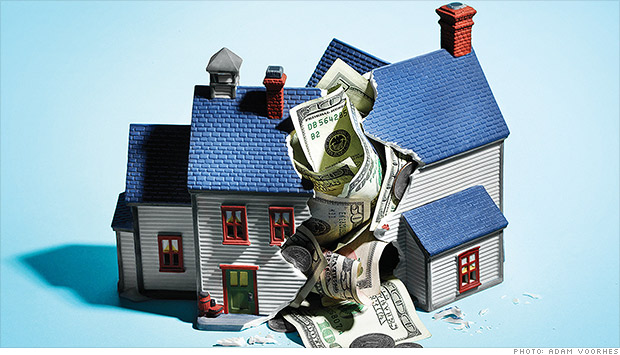
Considering a reverse mortgage to drum up retirement cash? Don't tap your home's equity too hard.
(Money Magazine)
The pitch may sound appealing, especially if you're among the 83% of boomers who plan to stay in their home through retirement: Tap your home's equity now and receive a monthly payment, line of credit, or lump sum, regardless of your credit score or income.
The mortgage will start accruing interest immediately, but you won't need to pay back a dime until you move out or die -- at which point you or your heirs must repay the bank in full.
Indeed, reverse mortgages can be a good option for seniors age 70 or older who are committed to staying in their homes and don't have the savings to cover their expenses, says elder-law attorney Janet Colliton of West Chester, Pa.
However, she adds that recent trends are making the loans a riskier proposition. For one, borrowers are younger: Last year 47% were in their sixties, more than double the percentage from 2001. A growing number (69%) are also taking their payout in a lump sum rather than a steady stream. And reports say predatory lenders have been pushing these mortgages on folks who can't afford them.
Related: Finding real estate opportunities in the New Year
The result: Borrowers who take the loan too soon, or spend the payout too quickly, could end up without a source of equity to fall back on -- and might even lose their homes.
If you or someone you love is thinking about a reverse mortgage, consider these questions. If you answer yes to even one, this type of loan is probably the wrong option for you.
Are you in your sixties?
You want to put off a reverse mortgage as long as possible. The amount you can borrow is based on the current interest rate (you can borrow more when it's lower), your home equity, and the age of the younger spouse. The older he or she is, the more you get.
On a $300,000 house with a $100,000 mortgage, for instance, a 75-year-old might receive a $574 monthly payment, while a 65-year-old would get just $411. (See reversemortgage.org for a calculator.)
Related: Your pension: Lump sum or lifetime benefits?
Younger borrowers also face more years of compound interest, which can quickly ratchet up the amount you owe.
There's also a greater chance that you'll run into unexpected medical bills or other expenses as you age, sapping your payout more quickly than you anticipated.
Will the costs be more than you can afford?
Reverse mortgages are a notoriously expensive way to tap equity.
For that borrower with the $300,000 home, fees would include $6,000 in upfront mortgage insurance, a $2,500 origination fee, and about $3,400 in traditional closing costs -- and that's before you get to the monthly mortgage insurance premium of 1.25% of the loan balance.
Related: Why home insurance costs so much
Plus, you'll still need to cover regular housing expenses such as taxes and maintenance.
Don't commit to the loan until you've met with an independent financial adviser to go over the total cost and discuss alternatives, says Steve Weisman, author of A Guide to Elder Planning.
Is there a better option?
Before turning to a reverse mortgage, homeowners should explore bolstering their finances by downsizing or working longer.
Those with good credit might also consider a traditional refinance or a home-equity line of credit (HELOC), where you draw only the funds you need and pay off interest as you go, says Waterford, Conn., financial planner Nancy Butler.
It's also a good idea to get your heirs involved -- particularly since they'll be responsible for paying off (or selling your house to pay off) the loan after your death. They may be able to provide a private reverse mortgage or become a part owner of the house now.
Ultimately, people should think very carefully before draining their home equity, says Margot Saunders, counsel at the National Consumer Law Center: "Once it's gone, it's gone." ![]()
Timing It Right
Taking a reverse mortgage when you're too young -- especially as a lump sum -- can leave you with no home equity in your old age.
| For a 65-year-old borrower with a $300,000 home and a $100,000 mortgage | |
| Lump-sum payment | $79,233 |
| Remaining equity | |
| After 5 years | $103,255 |
| After 10 yers | $85,496 |
| After 20 years | $0 |
NOTES: Assumes an HECM standard loan on a home in Tulsa, annual appreciation of 4%. Interest rate is 5.06%. SOURCE: Urban Financial Group
First Published: December 20, 2012: 5:31 AM ET
Anda sedang membaca artikel tentang
Reverse mortgage: Is it too risky?
Dengan url
http://ngopingeteh.blogspot.com/2012/12/reverse-mortgage-is-it-too-risky.html
Anda boleh menyebar luaskannya atau mengcopy paste-nya
Reverse mortgage: Is it too risky?
namun jangan lupa untuk meletakkan link
Reverse mortgage: Is it too risky?
sebagai sumbernya
0 komentar:
Posting Komentar